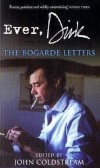
‘Ever, Dirk- The Bogarde Letters’ Edited by John Coldstream
London: Phoenix (an imprint of Orion Books), 2009. ISBN 978 0 7538 2589
1 628pp. (paperback) £12.99
It would be safe to say that Dirk Bogarde, actor, artist, and above all
English gentleman of letters, loved writing. His prolific output of
novels (15 in total in 21 years) would be highly respectable for an
author- but Bogarde continued to act and to take on positions of
responsibility. Although a stroke all but prevented him from writing
any more letters of any great length, Bogarde’s brain was still active-
and the last few letters in Ever, Dirk- The Bogarde Letters
are, poignantly, dictated ones. The book does not allow this trailing
away of the power of the written word to be its final blazon, however,
but instead revels in a few pages of “Dirk’s out-takes”- epithets and
comments ‘which did not make the final cut’ (p.597). These ensure the
volume leaves behind Bogarde’s wit and enjoyment of the English
language, my favourite being ‘after fifty three the face does’nt [sic]
suit youth anymore. It all sort of falls in…like a melting Walls
Ice-Cream with Chocolate…’(1973).
After a concise but detailed introductory section (dealing with,
amongst others, people cited in the letters, nicknames and a Bogarde
chronology), the book (which I shall now refer to as Ever, Dirk)
is divided into two sections- ‘The Continental Years’ (1969- February
1987) and ‘The British Years’ (March 1987- November 1997). This
timespan provides a fascinating insight into Bogarde’s outlook on life
from his approach to 50 years of age through to his mid. 70s, but also
his respective environments- from his beloved Clermont to, ultimately,
Cadogan Gardens. ‘It rains. God! How it rains…a flat grey light, a mist
hanging down to the grass like Miss Haversham’s Weddingdress’ (p.91)
Bogarde wrote in 1972 to Penelope Mortimer, but even this seemingly
negative view is tinged with almost grudging admiration for the
extremities of the weather. In his expression, Bogarde also belies his
artistic and sensitive nature- this is not merely a comment on the
weather but a simile of amusing yet intelligent thought. Ever, Dirk
is dotted with such observances, as well as (of course) references to
works being considered, works in progress, and works completed.
Perhaps the most fascinating thing about a book such as this though is
not so much what is said but how it is said- how Dirk
Bogarde’s public persona (matinee idol turned serious actor in several
films with Joseph Losey and later Italian maestro Luchino Visconti)
becomes the private man. Only in ones private correspondence or
writings (which one never envisages being published) does ones true
character emerge- and I think this is true of Dirk Bogarde. The letters
themselves, sent to family and friends- including Losey, Visconti,
Kathleen Tynan, Tom Stoppard, Dilys Powell and Norah Smallwood- reveal
a man who felt things very deeply yet was not afraid to confront them.
One such example of this is Bogarde’s 1970 letter to Visconti following
an article by Kathleen Tynan which appeared in Vogue. Evidently
the cause of Visconti’s displeasure, the article’s shortcomings are
discussed at length, but not before Bogarde tries to smooth things
over: ‘your long letter has just reached me today and filled me with
sadness to know that you are so unhappy’. (p.59). In a subsequent
letter, Bogarde (who by now had gained access to ‘this wretched
article’- p.61) tactfully acts as mediator between two friends,
revealing both his diplomacy and his loyalty to both parties in equal
measure.
As Ever, Dirk moves on through what would be highly productive
years in the actor’s life, sections of glossy photographs break up the
text to great effect. These pictures support the letters by showing
people, places and emotions that one has experienced- and come as a
breath of fresh air, showing as they often do Bogarde in relaxed mood.
What really comes across through the letters is both the actor’s warmth
and his personal nature- the more of them one reads the clearer one can
hear Dirk’s own voice speaking the words aloud. Thus, ahead of the
Cannes Film Festival (when D.B. was to be on the jury) he wrote to
critic Dilys Powell that ‘ahead is the horror of the festival. I can’t
imagine WHY I agreed to be President. Maybe because it IS an honour and
because I live in France, and what the hell…why not?’ (p.334). This
idiosyncratic writing style (the capital letters for emphasis being
just one aspect, punctuation and spelling errors being others) are
rather endearing, like the content of much of Bogarde’s letters,
dealing as they do with the ups and downs of trying to live an ordinary
life when you are no ordinary person.
Ever, Dirk is not a book to be read like a novel, to be
consumed like one would some cheap white wine on a sunkissed Spanish
terrace. Instead, it is to be savoured- imbibed gradually through many
small but satisfying visits, as one may indulge oneself by having a
glass of fine Tawny port of an evening. Its content and references make
Ever, Dirk less accessible than (say) The Kenneth Williams
Letters, but very appealing in its own way. It is clear that Dirk
Bogarde had a true grasp of the human condition, writing as he did with
such warmth and affection, and these qualities shine forth repeatedly
from the books many pages.
‘Ever, Dirk- The Bogarde Letters’ is available from Orion Books.
Orion Books
website
Back
Home

